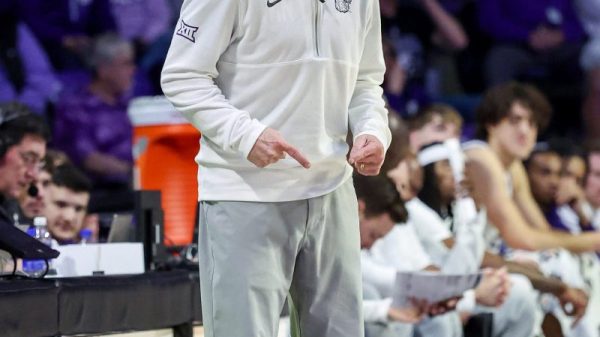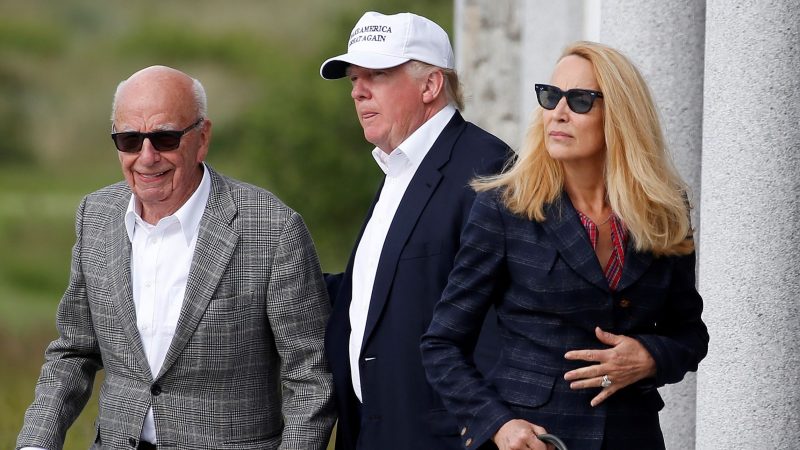Donald Trump couldn’t have asked for much more from Fox News over the course of the 2020 presidential election — or, really, over the course of his presidency. From start to finish, Fox News-viewing Republicans were more enthusiastic about Trump than about other Republicans (and certainly than Americans overall), thanks in part to the network’s incessant efforts to bash the left and its efforts to mostly ignore stories that would hurt him.
As the 2020 campaign progressed, the network ran interference in myriad ways. It quickly elevated Trump’s insistences that the country should move on from the coronavirus (so, Trump hoped, the economy would rebound before the election). It aired incessant footage of violence that followed Black Lives Matter protests that summer, often recycling footage for weeks on end. Earlier in his administration, Trump had simply rolled Fox News coverage into his campaign rallies. Host Sean Hannity explicitly endorsed him in 2016.
On Monday, though, we got a new look at how Fox boosted Trump — quietly, behind the scenes. And in the person of Fox Corp. chairman Rupert Murdoch.
The revelation comes from a court filing submitted by Dominion Voting Systems as part of its $1.6 billion defamation lawsuit against the company. Dominion makes voting machines that were the center of unfounded claims of fraud and tampering in the wake of the 2020 election — including on Fox News and Fox Business Network. In a filing released earlier this month, Dominion revealed internal messages between Fox News hosts showing that they didn’t believe the claims for which they were nonetheless providing airtime. The filing released Monday focuses more on Murdoch, as head of the Fox empire.
It includes this comment, offered almost as an aside.
“During Trump’s campaign, Rupert provided Trump’s son-in-law and senior advisor, Jared Kushner, with Fox confidential information about [Joe] Biden’s ads, along with debate strategy,” the filing reads. In a parenthetical, it explains some or all of that confidential information as “providing Kushner a preview of Biden’s ads before they were public.”
This is a remarkable claim. To best understand why requires an understanding of how political campaigns work.
There are two groups of voters that a campaign tries to contact: core supporters, whom the campaign tries to ensure cast a vote, and persuadable voters, people who would back the candidate if approached with the right message. To determine that message, campaigns conduct polls. Commonly, they’re structured like this:
Ask whom a respondent supports.Offer arguments against the candidates and measure support again.Offer rebuttals to those arguments and measure support for a third time.
The idea is to assess what issues or rhetoric will move persuadable voters or tamp down turnout among their opponent’s core support. In a well-funded campaign, attack ads are not random; they are leveraging issues that polling shows will achieve one of those outcomes.
Campaigns do opposition research on their own candidates to get a sense of what attacks are coming and to prepare for them. Now imagine if they knew with certainty what attacks were coming because the friendly chairman of a right-wing media organization was tipping you off.
My first response when reading the allegation included in the Dominion filing was to wonder what ads Murdoch had access to. Was there some repository of ads that media outlets shared? (There is not, a person familiar with the industry confirmed.) Did he have access to ads that run on Fox affiliates in local markets? My assumption was that the Biden campaign wasn’t spending a lot of money on Fox News spots, given the network’s audience.
But they were. Remember: One intended outcome of campaign spending can be to dampen support among your opponent’s base. During the Republican National Convention in August, for example, Biden’s campaign ran this two-minute spot on Fox News.
The campaign also made national buys, often during sporting events like the World Series. From April to June of 2020, one-fifth of the Biden campaign’s cable-TV advertising was on Fox News. The campaign ran more than 100 spots on “Fox & Friends” alone — even as the show was amplifying pro-Trump, anti-Biden messaging.
It’s not clear how often Murdoch might have given Kushner a preview of Biden spots or what came of it. The Trump campaign was not a traditional campaign, of course, rebutting attacks on the incumbent president’s policy positions and so on. It seems more likely that the fingerprints of Trump’s team seeing Biden’s spots would appear in the president’s Twitter feed, the campaign’s most closely watched rapid response outlet. (The ad above, leading with Trump’s slow descent down a ramp at West Point, does not seem to have inspired any response, much less a prebuttal.)
It’s important to note that sharing ads with a rival candidate is not common.
“There have been instances where a low staffer in a local TV station has done this,” veteran Democratic consultant Joe Trippi told The Post. “But for an owner or head of a network? I’ve never heard of something like this.”
That Murdoch facilitated such an arrangement isn’t a surprise, nor is it a surprise he offered Trump debate advice. In both the most recent and earlier filings from Dominion, Murdoch is quoted as advocating explicitly for his charges to help boost Republicans. “[W]e should concentrate on Georgia, helping any way we can,” Murdoch wrote to his team in the days before the runoff Senate races in that state — meaning, obviously, that they should help the Republicans win. In the new filing, he’s quoted as writing to the head of Fox News that “we must tell our viewers again and again what they will get” with tax legislation proposed by Trump. He was advocating for acting in service to Trump and Trump’s politics.
Contrast this with other cable-news channels. In 2010, MSNBC suspended host Joe Scarborough for having made small political contributions several years prior. “[I]t is critical that we enforce our standards and policies,” the network’s then-president, Phil Griffin, said in a statement. Fox News hosts, on the other hand, host Republican fundraising dinners and speak at political rallies. The difference is stark.
A decade ago, Murdoch was mired in a different scandal. British publications he owned were caught illegally accessing voice mails of various public figures. An extensive investigation led to arrests and resignations, the closure of one of Murdoch’s papers and the end of a takeover bid News Corporation was planning.
Murdoch himself was able to remain at a distance from the scandal but admitted that he bore responsibility for what had occurred. A parliamentary report was harshly critical of Murdoch, stating that he “exhibited willful blindness to what was going on in his companies and publications.” Because this culture of illegal behavior was allowed to spread, the report concluded, “Rupert Murdoch is not a fit person to exercise the stewardship of a major international company.”
He remained the primary steward of Fox, luckily for Trump.



























